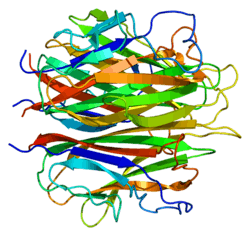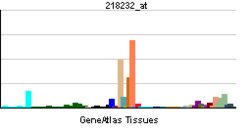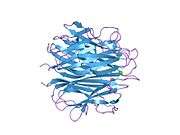C1QA
Complement C1q subcomponent subunit A is a protein that in humans is encoded by the C1QA gene.[3]
This gene encodes a major constituent of the human complement system subcomponent C1q.
C1q associates with C1r and C1s in order to yield the first component of the serum complement system. Deficiency of C1q has been associated with lupus erythematosus and glomerulonephritis. C1q is composed of 18 polypeptide chains: six A-chains, six B-chains, and six C-chains. Each chain contains a collagen-like region located near the N terminus and a C-terminal globular region. The A-, B-, and C-chains are arranged in the order A-C-B on chromosome 1. This gene encodes the A-chain polypeptide of human complement subcomponent C1q.[4]
References
Further reading
- Petry F (1999). "Molecular basis of hereditary C1q deficiency.". Immunobiology. 199 (2): 286–94. doi:10.1016/s0171-2985(98)80033-8. PMID 9777412.
- Thielens NM, Tacnet-Delorme P, Arlaud GJ (2003). "Interaction of C1q and mannan-binding lectin with viruses.". Immunobiology. 205 (4–5): 563–74. doi:10.1078/0171-2985-00155. PMID 12396016.
- Reid KB (1976). "Isolation, by partial pepsin digestion, of the three collagen-like regions present in subcomponent Clq of the first component of human complement". Biochem. J. 155 (1): 5–17. PMC 1172796
 . PMID 7240.
. PMID 7240.
- Reid KB (1979). "Complete amino acid sequences of the three collagen-like regions present in subcomponent C1q of the first component of human complement". Biochem. J. 179 (2): 367–71. PMC 1186634
 . PMID 486087.
. PMID 486087.
- Krumdieck R, Höök M, Rosenberg LC, Volanakis JE (1992). "The proteoglycan decorin binds C1q and inhibits the activity of the C1 complex". J. Immunol. 149 (11): 3695–701. PMID 1431141.
- Sellar GC, Blake DJ, Reid KB (1991). "Characterization and organization of the genes encoding the A-, B- and C-chains of human complement subcomponent C1q. The complete derived amino acid sequence of human C1q". Biochem. J. 274 (2): 481–90. PMC 1150164
 . PMID 1706597.
. PMID 1706597.
- Ebenbichler CF, Thielens NM, Vornhagen R, et al. (1992). "Human immunodeficiency virus type 1 activates the classical pathway of complement by direct C1 binding through specific sites in the transmembrane glycoprotein gp41". J. Exp. Med. 174 (6): 1417–24. doi:10.1084/jem.174.6.1417. PMC 2119058
 . PMID 1744579.
. PMID 1744579.
- Su H, Boackle RJ (1991). "Interaction of the envelope glycoprotein of human immunodeficiency virus with C1q and fibronectin under conditions present in human saliva". Mol. Immunol. 28 (8): 811–7. doi:10.1016/0161-5890(91)90044-K. PMID 1875953.
- Busby TF, Ingham KC (1990). "NH2-terminal calcium-binding domain of human complement C1s- mediates the interaction of C1r- with C1q". Biochemistry. 29 (19): 4613–8. doi:10.1021/bi00471a016. PMID 2372546.
- Bing DH, Almeda S, Isliker H, et al. (1982). "Fibronectin binds to the C1q component of complement". Proc. Natl. Acad. Sci. U.S.A. 79 (13): 4198–201. doi:10.1073/pnas.79.13.4198. PMC 346605
 . PMID 6981115.
. PMID 6981115.
- Reid KB, Gagnon J, Frampton J (1982). "Completion of the amino acid sequences of the A and B chains of subcomponent C1q of the first component of human complement". Biochem. J. 203 (3): 559–69. PMC 1158269
 . PMID 6981411.
. PMID 6981411.
- Stoiber H, Thielens NM, Ebenbichler C, et al. (1994). "The envelope glycoprotein of HIV-1 gp120 and human complement protein C1q bind to the same peptides derived from three different regions of gp41, the transmembrane glycoprotein of HIV-1, and share antigenic homology". Eur. J. Immunol. 24 (2): 294–300. doi:10.1002/eji.1830240203. PMID 7507842.
- Prohászka Z, Hidvégi T, Ujhelyi E, et al. (1995). "Interaction of complement and specific antibodies with the external glycoprotein 120 of HIV-1". Immunology. 85 (2): 184–9. PMC 1383879
 . PMID 7642209.
. PMID 7642209.
- Stoiber H, Ebenbichler CF, Thielens NM, et al. (1995). "HIV-1 rsgp41 depends on calcium for binding of human c1q but not for binding of gp120". Mol. Immunol. 32 (5): 371–4. doi:10.1016/0161-5890(94)00156-U. PMID 7739575.
- Gulati P, Guc D, Lemercier C, et al. (1994). "Expression of the components and regulatory proteins of the classical pathway of complement in normal and diseased synovium". Rheumatol. Int. 14 (1): 13–9. doi:10.1007/BF00302666. PMID 7939135.
- Gulati P, Lemercier C, Guc D, et al. (1994). "Regulation of the synthesis of C1 subcomponents and C1-inhibitor". Behring Inst. Mitt. (93): 196–203. PMID 8172568.
- Ghebrehiwet B, Lim BL, Peerschke EI, et al. (1994). "Isolation, cDNA cloning, and overexpression of a 33-kD cell surface glycoprotein that binds to the globular "heads" of C1q". J. Exp. Med. 179 (6): 1809–21. doi:10.1084/jem.179.6.1809. PMC 2191527
 . PMID 8195709.
. PMID 8195709.
- Thielens NM, Bally IM, Ebenbichler CF, et al. (1994). "Further characterization of the interaction between the C1q subcomponent of human C1 and the transmembrane envelope glycoprotein gp41 of HIV-1". J. Immunol. 151 (11): 6583–92. PMID 8245486.
- Hidvégi T, Prohászka Z, Ujhelyi E, et al. (1994). "Studies on the mechanism of complement-mediated inhibition of antibody binding to HIV gp41". Clin. Exp. Immunol. 94 (3): 490–3. doi:10.1111/j.1365-2249.1993.tb08223.x. PMC 1534428
 . PMID 8252810.
. PMID 8252810.
PDB gallery |
|---|
|
| 1pk6: Globular Head of the Complement System Protein C1q |
|
|


 . PMID 7240.
. PMID 7240. . PMID 486087.
. PMID 486087. . PMID 1706597.
. PMID 1706597. . PMID 1744579.
. PMID 1744579. . PMID 6981115.
. PMID 6981115. . PMID 6981411.
. PMID 6981411. . PMID 7642209.
. PMID 7642209. . PMID 8195709.
. PMID 8195709. . PMID 8252810.
. PMID 8252810.